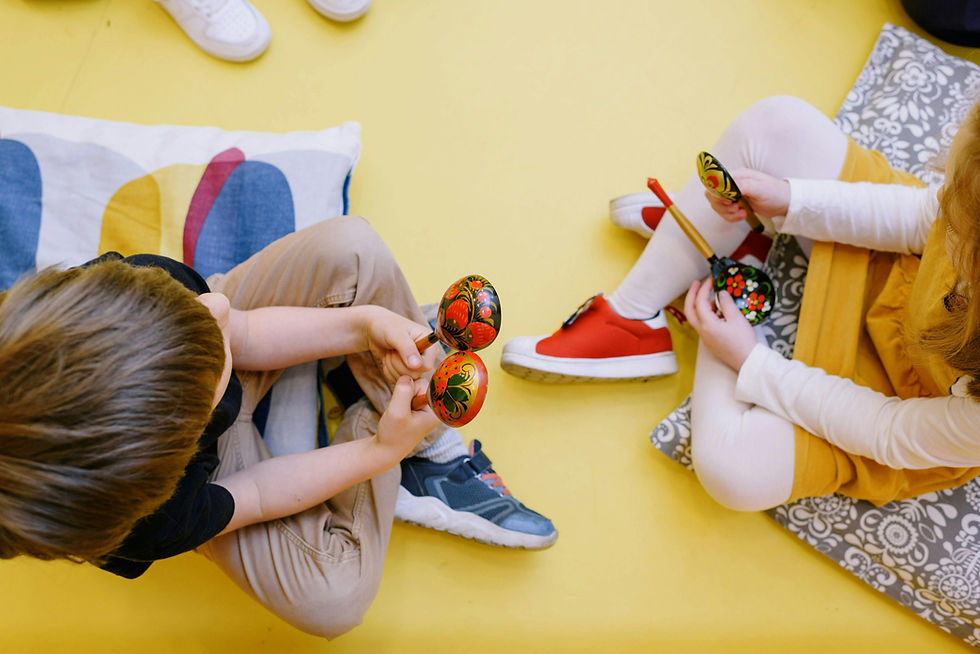Music and Homeschooling: How Ensemble Learning Builds More Than Skill
- Brittany Bennett
- Sep 15
- 3 min read

In today’s ever-evolving educational landscape, more and more families are choosing homeschooling for its flexibility, personalized pace, and opportunity for deeper, values-based learning. But one challenge that often arises in homeschool households is how to offer children the same collaborative and social experiences found in traditional classrooms. That’s where ensemble music programs come in.
At NoteWise Music Academy, our Homeschool Orchestra is designed specifically for families who want a joyful, enriching, and community-centered experience to complement their home education. But beyond the music, what do ensemble programs really offer homeschoolers? A lot more than you might think.
1. Ensemble Learning Builds Teamwork and Social Skills
Homeschoolers often excel in independent learning, but ensemble music classes provide a valuable space to develop collaboration. In an orchestra, students must listen closely, adjust to others, and work toward a common goal. They learn to communicate through timing, tone, and mutual support—skills that translate well to everyday life, friendships, and future workplaces.
Being part of an ensemble teaches students to take turns, be patient, and show up for one another. These social-emotional skills are especially important in the formative years and can be harder to nurture through solo activities or screen-based learning.
2. Music Strengthens Focus and Discipline
Learning to play an instrument already supports concentration, but participating in a group amplifies that effect. In an ensemble setting, students must follow a conductor, watch for cues, and stay engaged through longer musical pieces. They can’t simply zone out—they have a responsibility to the group.
This structured discipline helps build habits that benefit academic work. Students learn to prepare, practice, and show up consistently, which boosts self-motivation. The routine of weekly rehearsals and monthly goals offers a healthy rhythm to their homeschool week.
3. Students Gain Real-World Performance Experience
Unlike private lessons that may only involve a yearly recital, ensemble groups regularly prepare for public performances. This provides homeschool students with valuable stage time that builds confidence and presence.
At NoteWise, our Homeschool Orchestra performs in seasonal showcases, school-wide events, and community recitals. These experiences foster a sense of pride, anticipation, and courage—qualities that are vital for personal growth and future leadership opportunities.
4. Learning in Groups Inspires Musical Growth
Ensemble learning naturally sparks progress. Students are inspired by peers who may be slightly ahead of them in ability and encouraged by those just beginning. This dynamic fosters healthy motivation, goal-setting, and mentorship.
Hearing others play and watching their techniques in real time enhances listening skills and expands musical awareness. Even shy or reserved students tend to blossom when surrounded by peers who are also learning and growing.
5. It Encourages Responsibility and Leadership
Being part of a music ensemble means showing up on time, practicing your part, and being ready to contribute. This teaches accountability in a fun and meaningful way. As students progress, they may even have opportunities to lead warmups, tune the group, or support younger musicians.
These small moments build leadership skills that last. Students begin to see themselves not just as learners, but as contributors and role models.
6. Ensemble Programs Create Community for Families
One of the beautiful side effects of homeschool music programs is the community it builds—not just for students, but for parents too. As families gather weekly, friendships naturally form. Parents exchange homeschooling tips, support one another, and celebrate their children’s progress together.
At NoteWise, we intentionally nurture this sense of belonging. Our homeschool orchestra isn’t just a class—it’s a musical family. Whether your child is brand new to music or already has a few years of experience, there’s a place for them to belong, grow, and shine.
7. Flexible and Affordable Learning That Fits Homeschool Life
Our Homeschool Orchestra is built with families in mind. With a month-to-month commitment, low tuition (including a family rate), and no pressure for long-term contracts, we make it easy to jump in and try something new.
Classes are held once a week on Thursday afternoons, so they won’t disrupt your core homeschooling schedule. Plus, students of all ages and levels are welcome, allowing siblings to participate together.
8. Music Enhances the Whole Child
Perhaps most importantly, ensemble learning supports holistic development. Music activates both sides of the brain, enhancing creativity, memory, and emotional intelligence. It strengthens fine motor skills, self-expression, and emotional regulation.
For homeschoolers—who often enjoy a well-rounded and deeply meaningful education—music is a perfect fit. It’s not just about learning notes or playing in tune. It’s about building resilience, connection, and joy.
Join the NoteWise Homeschool Orchestra
If you’re a homeschooling parent looking for a creative, fun, and structured group learning opportunity, we invite you to check out the NoteWise Homeschool Orchestra.
To enroll, email info@notewisemusic.com or call (214) 301-3190.
Let your homeschooler discover the magic of ensemble music—and grow in ways far beyond the notes on the page.





Comments